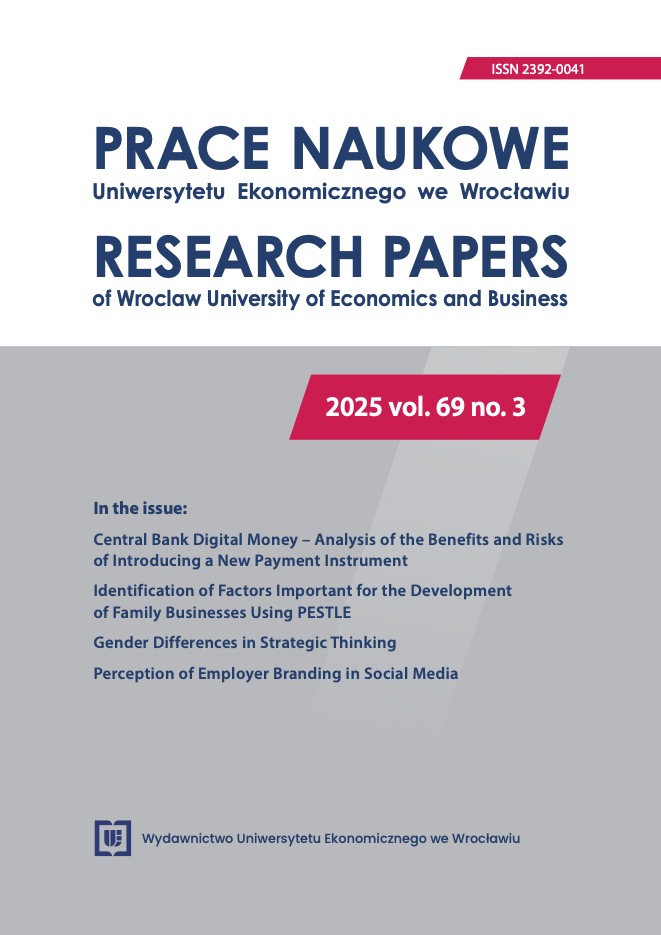Sustainable Business Model in Reporting of Healthcare Entities
DOI:
https://doi.org/10.15611/pn.2025.3.09Keywords:
sustainable business model, healthcare entity, quality in healthcare, management controlAbstract
Aim: The aim of the article is to indicate the possibilities of using information obligations, including good practices appropriate for reporting by healthcare entities, in reporting, specifically in the scope of a sustainable business model in healthcare entities.
Methodology: The research methods used for the article included a review of literature and legal regulations concerning healthcare entities. On their basis, two hypotheses were formulated, which were positively verified by conducting research based on survey, documents, and case study.
Results: The declarations regarding reporting on sustainability activities exceed the degree of their reporting. There are good practices that are increasingly used in the public sector.
Implications and recommendations: Based on the research results, it was found that the regulations applicable to healthcare entities and the growing number of examples of good practices justify the definition of industry-specific reporting schemes.
Originality/value: The originality of the article constitutes the connection of the issues of sustainability, the essence of the business model, the formal conditions of functioning of healthcare entities, industry-specific regulations, and good practices in the field of reporting. The value of the article comes down to indicating the flexibility of the business model, which means its adaptability in all conditions.
Downloads
References
Baran, W. (2017). System informacyjny rachunkowości zarządczej w samodzielnym publicznym zakładzie opieki zdrowotnej. Oficyna Wydawnicza SGH.
Castano, R. (2014). Towards a Framework for Business Model Innovation in Health Care Delivery in Developing Countries. Medicine for Global Health, 12(233). https://doi.org/10.1186/s12916-014-0233-z
Cosenz, F., Noto, G., Cavadi, G., Bivona, E. i Scirè, G. (2024). Pursuing Sustainable Performance in Healthcare Organizations: A Sustainable Business Model Perspective. Journal of Health Organization and Management, 38(5), 741-759. https://doi.org/10.1108/JHOM-12-2023-0369
Domańska-Szaruga, B. (2011). Rola czynników ESG w budowaniu wartości przedsiębiorstwa. Współczesne Zarządzanie, (4), 141-151.
Dyrektywa Parlamentu Europejskiego i Rady (UE) 2022/2464 z dnia 14 grudnia 2022 r. w sprawie zmiany rozporządzenia (UE) nr 537/2014, dyrektywy 2004/109/WE, dyrektywy 2006/43/WE oraz dyrektywy 2013/34/UE w odniesieniu do sprawozdawczości przedsiębiorstw w zakresie zrównoważonego rozwoju (Dz. U. UE z 2022 r. L 322/15)
Erin, O. A., Bamigboye, O. A. i Oyewo, B. (2022). Sustainable Development Goals (SDG) Reporting: An Analysis of Disclosure. Journal of Accounting in Emerging Economies, 12(5), 761-789. https://doi.org/10.1108/JAEE-02-2020-0037
Follen, M., Fradkin, L., Crane, J. i Noon, C. (2018). Lean Management in Obstetrics and Gynecology: Application in the Ambulatory Clinic Pre- and Post-Kaizen. Open Journal Obstetrics and Gynecology, 8(14). https://doi.org/10.4236/ojog.2018.814161
Grupa LUX MED. (b.d.). Raport Zrównoważonego Rozwoju Grupy LUX MED za rok 2023. Pobrano 2 marca 2025 z https://www.luxmed.pl/assets/media/Raport_LUXMED_2023.pdf
Guarcello, C. i Raupp, E. (2021). Pandemic and Innovation in Healthcare: The End-to-End Innovation Adoption Model. Brazilian Administration Review, 18(3). https://doi.org/10.1590/1807-7692bar2021210009
Karwowski, M. (2017). Identyfikacja informacji o modelu zrównoważonego biznesu na podstawie raportów zintegrowanych. Prace Naukowe Uniwersytetu Ekonomicznego we Wrocławiu, (479), 64073. https://doi.org/10.15611/pn.2017.479.06
Karwowski, M. (2018). Wpływ modelu zrównoważonego biznesu na kształt raportu biznesowego. Studia i Materiały Wydziału Zarządzania i Administracji Wyższej Szkoły Pedagogicznej im. Jana Kochanowskiego w Kielcach, 2(4), 125-136.
Karwowski, M. (2021). The Business Model as a Key Component of Integrated Reporting. W: D. Prochazka (red.), Digitalization in Finance and Accounting (s. 265-275). Springer.
Karwowski, M., Świerc, Z. i Baran, W. (2023). Model biznesu w sprawozdaniach podmiotów leczniczych w okresie pandemii COVID-19. W: D. Dziawgo. i E. Makowska (red.), Historia – Teoria – Praktyka – Wyzwania rachunkowości (s. 141-166). Wydawnictwo Naukowe Uniwersytetu Mikołaja Kopernika. https://doi.org/10.12775/978-83-231-5198-2
Kutzin, J. (2013). Health Financing for Universal Coverage and Health System Performance: Concepts and Implications for Policy. Bull World Health Organ, 91(8), 602-611. http://dx.doi.org/10.2471/BLT.12.113985
Liu, Z., Shi, Y. i Yang, B. (2022). Open Innovation in Times of Crisis: An Overview of the Healthcare Sector in Response to the COVID-19 Pandemic. Journal of Open Innovation: Technology, Market, and Complexity, 8(21). https://doi.org/10.3390/joitmc8010021
Ministerstwo Finansów. (2009). Komunikat nr 23 Ministra Finansów z dnia 16 grudnia 2009 r. w sprawie standardów kontroli zarządczej. Pobrano 20 lutego 2025 z https://www.gov.pl/web/finanse/standardy-i-wytyczne-kontrola-zarzadcza
Minister Zdrowia. (2024). Obwieszczenie Ministra Zdrowia z dnia 6 września 2024 r. w sprawie standardów akredytacyjnych dla działalności leczniczej w rodzaju całodobowe i stacjonarne świadczenia zdrowotne szpitalne (Dz. Urz. MZ z 2024 r., poz. 73)
Quentin, W., Partanen, V., Brownwood, I. i Klazinga N. (2024). Measuring Healthcare Quality. W: R. Busse, N. Klazinga, D. Panteli i W. Quentin (red.), Improving Healthcare Quality in Europe: Characteristics, Effectiveness and Implementation of Different Strategies. WHO i OECD. Pobrano 2 marca 2025 z https://www.researchgate.net/publication/339386881_Measuring_healthcare_quality#full-text
Plan Be Eco. (2024, 13 sierpnia). ESG Reporting in the Healthcare Industry. Pobrano 1 marca 2025 z https://planbe.eco/en/blog/esg-reporting-in-the-healthcare-industry/
Polska Federacja Szpitali (PFSZ). (2024). Podręcznik Zielonej Transformacji dla Szpitali. Pobrano 2 marca 2025 z https://www.pfsz.org/podrecznik-zielonej-transformacji-dla-szpitali
Ratajczak, M. (2013). Ekorozwój jako podstawa odpowiedzialnego biznesu (CSR) w obszarze środowiska naturalnego. Prace Naukowe Uniwersytetu Ekonomicznego we Wrocławiu, (288), 151-159.
Sachdev, G. (2014). Sustainable Business Models: Systematic Approach Toward Successful Ambulatory Care Pharmacy Practice. American Journal of Health-System Pharmacy, 71(16), 1366-1374. https://doi.org/10.2146/ajhp140078
Sepetis, A., Forios, R., George, P., Karanikas, H. i Schallmo, D. (2024). A Sustainable Model for Healthcare Systems: The Innovative Approach of ESG and Digital Transformation. Healthcare, 12(2): 156. https://doi.org/10.3390/healthcare12020156
Stubbs, W. i Cocklin, C. (2008). Conceptualizing a “Sustainability Business Model”. Organization & Environment, 21(2), 103-127. https://doi.org/10.1177/1086026608318042
Szczepankiewicz, E. i Zaleska, B. (2018). Development of Internal Audit Systems in Polish University Hospitals. Journal of Public Governance, 45(3), 60-72. https://doi.org/10.15678/ZP.2018.45.3.04
Szczepankiewicz, E., Zaleska, B. i Bartoszewicz, A. (2021). Assessment of the Level of Implementation of Internal Audits in Polish Public Hospitals. European Research Studies Journal, 24(2), 78-95. https://doi.org/10.35808/ersj/2113
Thomson, S., Foubister, T., Figueras, J., Kutzin, J., Permanand, G. i Bryndová, L. (2009). Addressing Financial Sustainability in Health Systems. World Health Organization. Pobrano 20 lutego 2025 z https://www.researchgate.net/publication/255601028_Addressing_Financial_Sustainability_in_Health_Systems
Uniwersytecki Szpital Kliniczny w Opolu. (b.d.). https://www.usk.opole.pl/
Ustawa z dnia 29 września 1994 r. o rachunkowości (Dz. U. z 2023 r., poz. 120 ze zm.)
Ustawa z dnia 27 sierpnia 2009 r. o finansach publicznych (Dz. U. 2024.1530)
Ustawa z dnia 24 sierpnia 2023 r. o jakości i bezpieczeństwie pacjenta (Dz. U. z 2023 r., poz. 1692)
Downloads
Published
License
Copyright (c) 2025 Zuzanna Świerc, Wioletta Baran, Mariusz Karwowski

This work is licensed under a Creative Commons Attribution-ShareAlike 4.0 International License.
Accepted 2025-05-13
Published 2025-10-07










